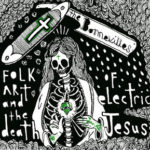
Twenty Stone Blatt Records
Rory Gallagher would’ve loved these guys.
No matter how the late Irish guitar genius’ music was shaped by various studio/producer combinations over the years, his finest moments were in the live setting, where the sweat, grit, and grease of his Mississippi-by-way-of-County-Cork blues mojo was free to run. And that’s just exactly what The Bonnevilles are all about, as well.
Pay attention, now: percussion monster Chris McMullan and guitarist/vocalist (and occasional keyboardist) Andrew McGibbon Jr. aren’t Irish lads trying to sound like they grew up on the Delta; they’re honest-and-true bluesmen – pure and simple. They may have Celtic souls, but this is the real shit that knows no country codes, boys and girls … the blues is the blues.
Folk Art And The Death Of Electric Jesus is wild and wooly – a masterpiece of just-enough-production-to-keep-stuff-from-exploding by Belfast-based sound wizards Walter d’Goon and Jon Moorehead. Nobody was bothered by squeals, sizzles, crashes, or thumps: the tape rolled while McGibbon and McMullan played these tunes like they could save the world from itself. The only thing that could get you any closer to sitting on McGibbon’s amp in the middle of Graham House Studio would be a sweat-soaked scratch-and-sniff panel in the multi-fold liner notes.
The duo manages to pull off an amazing array of sounds over the dozen cuts on Folk Art : right off the bat, “You’re Not Alone” lets you know that The Bonnevilles mean business – fat-toned fuzz guitar and a walloping drum sound simmer behind McGibbon’s bare-souled testifying on the verses; just shy of the song’s midpoint, McMullan’s cymbals lay down a sheen that McGibbon’s slide guitar skates across; there’s a bit of madness before the chaos subsides; they ease back into the final verse (flexing just enough muscle to remind you of just how nasty things could get if they need to) and take it home. Elsewhere, the trance blues of “Hell” is sung in the voice of one looking the devil right in the eye; McMullan’s bass drum pedal propels “Son Of Reverbio” through the gears while McGibbon’s slide guitar does the steering; and “Separate Ways” is a total midnight-in-the-garage tango with occasional wisps of keys by McGibbon that’ll give you the creeps. Looking to boogie, children? “10,000” and “Get Myself A Gun” will feed that particular jones. The ominous Black Sabbath-flavored roar at the beginning of “By The Time November Comes” will have you expecting Ozzy to croak out “Ironman”, but no – this is The Bonnevilles’ territory, with a chest-thumping backbeat and bellowing guitar looking for some salvation. “Kneel At The Altar Parts 1 & 2” takes its time backing you up against the wall (listen to those barely-contained amp shrieks and moans in the background) and “The Ballad Of That Murdering Bastard Ed Millar” is as advertised: a stripped-to-the-bones lo-fi acoustic murder ballad.
Capable of making a lot of noise when they want to, McMullan and McGibbon also know how to hold back when they need to – allowing the knockout punch to land all the harder. The tunes on Folk Art And The Death Of Electric Jesus are all the more impressive when you take in that these are all originals … and while there are wisps of inspirations here and there, the bottom line is, McMullan and McGibbon are bluesmen.
Rory Gallagher would’ve loved these guys.



No Comments comments associated with this post